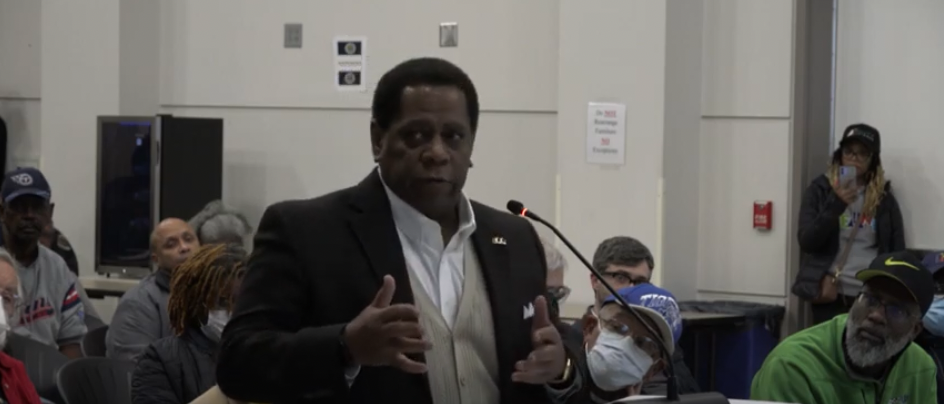The East Bank Stadium Committee finished a month of public meetings in Antioch, East Nashville, Bellevue, North Nashville and Hermitage this week. Public discussion turned up mixed reactions from Nashvillians who criticized city spending priorities and debated the deal’s financing structure. Metro Council is scheduled to vote on a Titans term sheet, seen as a precursor to a new lease with the team, on Dec. 20.
Council formed the East Bank Stadium Committee over the summer to gather information and lead efforts related to legislation concerning the East Bank and a potential new Titans stadium, the city’s biggest budget item and slated to be the second-most-expensive sports stadium in the world. Each public meeting started with a presentation of the committee's research and an outline of the proposal in front of council. Based on the current deal, Metro will issue $760 million in bonds for its share of a $2.1 billion price tag. The state will chip in $500 million. The NFL is ready to back $200 million in loans and grants and the Titans said they'd fund the rest, aided by the sale of new personal seat licenses.
The merits and pitfalls of a future stadium have filtered into the public via the mayor’s office, which is leading negotiations with the team, the team itself and councilmembers. While the first two have been bullish on the proposal, the committee’s efforts, led by chair Bob Mendes, have kicked the tires on everything from financing to the city’s alternatives. Mendes and fellow councilmembers have also pointed out all that they don’t know about the deal ahead of their expected vote on Tuesday.
Public discussion reflected an appetite for more information and residents suspicious about who will and won’t benefit from the plan. Several Nashvillians spoke about how the project is the latest in a long-burning city hall obsession with downtown that stretches back to the 1990s and has come at the expense of residential neighborhoods. Others appeared confounded that the city would carve out a historic public subsidy for a sports team amid ongoing affordability crises in housing and transportation, city employees calling for pay increases and a struggling school system.
“I come every year to beg city council — all y’all sitting up here — for money,” Honey Hereth, a Metro Nashville Public Schools employee, told councilmembers at the committee’s Bellevue meeting on Dec. 7. “It is disheartening that y’all are going to just throw money at the Tennessee Titans.”
In Hermitage, Jordan Huffman spoke to the committee on behalf of the Donelson-Hermitage Neighborhood Alliance.
“We’re tired of seeing investment after investment into our downtown corridor with seemingly no benefit to the people who live here,” said Huffman. “I have yet to see anyone — from Metro government, from the stadium authority — to discuss the cons. And that ... should be a red flag to everybody."
Proponents for the stadium often cited a deep personal attachment to the team, referencing fond memories growing up watching games or identifying as proud season ticketholders.
Kristi Driver, a Wilson County resident who spoke at the Dec. 12 meeting in Hermitage, shared memories of cheering on the Titans with her dad.
“At his funeral, he was dressed in a Titans pullover with his favorite Super Bowl cap,” said Driver. “At the very end of it, I spoke and played the Music City Miracle radio broadcast.”

Others who spoke on behalf of the stadium mentioned professional ties to entertainment or hospitality and forecasted the stadium’s potential boon for the tourism economy. Michael Carter, of Pinnacle Construction Partners, and Don Hardin, of Don Hardin Group Development, two of the city’s major Black-owned construction and development firms, spoke to the economic impact that a massive building project could bring to minority- and women-owned businesses. Carter worked on Geodis Park and Hardin worked on Music City Center and First Horizon Park.
“It’s material in terms of the kinds of money that’s going to come back and flow into the pockets of painters and carpenters and plumbers who look like all of us in this audience,” Carter told the room. Hardin and Carter spoke at the Dec. 1 public meeting in North Nashville.
The city’s current lease with the Titans, signed in 1996 to woo the team from Houston, allows the Titans to charge the city for ongoing maintenance costs and requires Metro to keep Nissan Stadium in "first-class condition." The mayor’s key argument for a new lease — and an accompanying future stadium — has been a proposed switch to revenue bonds backed by sales taxes, typically riskier bonds that shift the city’s tax burden to tourism, incentivizing Metro to keep hotels full and to build and support a commercial district on the East Bank. A few residents discussed the financial trade-offs but most were hung up on the optics, either supportive of a deal that rewarded their favorite NFL team or frustrated with the city for putting a high-dollar football stadium over Nashville’s fundamental needs. Either way, countywide public meetings showed a city with strong feelings about the proposal and previewed what may emerge as a key wedge issue for voters in the increasingly crowded 2023 mayoral race.





